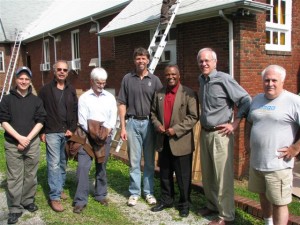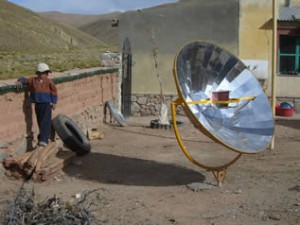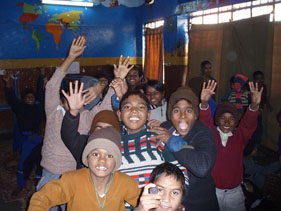Community Solar Pioneers
 David Brosch had a problem many Americans can relate to. He wanted solar power, but wasn’t able to put it on his house. His roof had the wrong orientation, a tree partially blocked the sun, and it was more than he could afford. Many of his neighbors were in the same situation — some were renters, others were too busy to handle the process of an installation on their house.
David Brosch had a problem many Americans can relate to. He wanted solar power, but wasn’t able to put it on his house. His roof had the wrong orientation, a tree partially blocked the sun, and it was more than he could afford. Many of his neighbors were in the same situation — some were renters, others were too busy to handle the process of an installation on their house.
They got together and formed a company, University Park Community Solar, and approached a local church with a large roof and good solar orientation. In exchange for placing solar panels on it’s roof, the church would be guaranteed a long-term low price of electricity. David told us: “We wanted a project that could stand on it’s own. Not one funded by donations, but something that was financially viable that folks would be willing to invest in. A solar project done right can turn a profit, so we thought, let’s pool our money and do it together.” Sounds simple enough, right?
As far as we can tell, no one had ever pulled off a project quite like that before. UPCS needed to come up with the right legal entity, faced securities regulations that restrict non-accredited investors (i.e. non-wealthy people) from investing in the project, and had to figure out how to utilize federal credits that required “passive income” to apply it to. It took nearly three years, but this Maryland group finally installed the 21.9 kW system this past May. It is believed to be one of the first community-initiated and owned solar electric systems in the U.S.
The project is expected to generate a 7-8% return on investment over the life of the project for the 30-plus area members. By providing clean electricity for the Church of the Brethren, UPCS will be reducing the region’s reliance on coal-based power. PEPCO, the major electric utility for Washington D.C. and the Maryland suburbs, purchases more than half of its power from coal-burning generating plants, which get their coal from destructive Mountaintop Removal mining operations in Appalachia. [Check www.ilovemountains.org to see if your electricity comes at the expense of mountains too.] You’d think the federal government would do anything it could to support the replication of the University Park model. It’s a market-based solution to the unemployment problem, while also helping achieve clean energy and climate objectives. But it’s actually the federal government that’s in the way.
One of the biggest roadblocks is the 1933 Securities Act that was designed to protect “widows and orphans” from crooked securities dealers during the era’s financial depression. Today it prevents people who make less than $200k a year or who hold liquid assets of less than $1 million from investing in a whole host of unregistered securities, including most clean-energy projects. There should to be a way for average people to invest without the need for deal-killing securities registration requirements.
Another roadblock is that most of the incentives for clean-energy development are structured as tax credits, so most potential community organizations (including non-profits like churches and schools, Native American tribes, etc.) can’t take advantage of them. Because UPCS completed their project prior to the end of 2010, it can trade the tax credits for a 30% grant through the US Treasury as a result of the federal stimulus bill. However, solar projects completed after 2010 will not be able to receive the grant, reducing their financial viability.
The University Park Community Solar ran into every bureaucratic red-taped government wall and jumped over, dug under, and blew it up and changed the model. They are one of many groups across the country working to not only clean up, but also democratize energy in America, with community solar power. They’re already planning a second project. We hope others follow their lead. Billy Parish:Founder, Energy Action Coalition-Written with Daniel Rosen and cross-posted from Grist.org.
Brown argues environment could create jobs in second debate of governor’s race
 Not too much talk about the environment in today’s debate between Jerry Brown and Meg Whitman in California’s governor’s race. What talking there was, Brown did it. In answer to a question about job creation in California that pointed out higher unemployment for Latinos, Brown responded that 1.9 million new jobs developed in California while he was governor. He created the California Conservation Corps, which has since had 100-thousand people pass through its program.
Not too much talk about the environment in today’s debate between Jerry Brown and Meg Whitman in California’s governor’s race. What talking there was, Brown did it. In answer to a question about job creation in California that pointed out higher unemployment for Latinos, Brown responded that 1.9 million new jobs developed in California while he was governor. He created the California Conservation Corps, which has since had 100-thousand people pass through its program.
“We can power our factories, we can retrofit our buildings, we can build transmission lines, solar collectors, geothermal, wind machines, California was the leader,” Brown said. “In renewable energy. now we’re behind iowa and texas and china. I believe we can be the leader again.” Brown said some of these projects would be funded by electric utilities. And he said he had a concrete plan: 20-thousand megawatts of energy created in California by 2020, 500-thousand resulting jobs. “I’m not talking about just a few jobs in the desert. I’m talking about retrofitting all the buildings of California. the commercial, the residential,” he said. “Putting young people to work. Whoever’s out of work – this is a major public works project.” Brown also said high speed rail would create jobs – something Whitman doesn’t support.Source By Molly Peterson
Solar Poder
It’s the sort of project people dream of when they wax idealistic about carbon offsets: In northern Argentina – where sun is plentiful – solar-powered ovens could generate carbon offsets, and thus funds, for rural communities. The ovens are made locally with polished aluminum to better catch the sun’s rays, and are 100 percent solar powered, which means locals don’t need firewood or gas to cook. By reducing the use of wood and fossil fuels, the ovens reduce emissions. Now, the EcoAndina Foundation, which helped develop the ovens, is hoping to verify those reductions in order to get the locals carbon credits that they can sell photo courtesy ecoandinaIn northern Argentina, EcoAndina is giving villages solar powered ovens, heaters and water heaters. Now the villages hope to turn their emissions reduction into income by selling verified carbon offsets.
Since EcoAndina began working in the region 20 years ago, it has distributed solar-powered ovens, heaters, and hot water heaters to hundreds of residents and schools. In addition to reducing emissions, the units help stave off the desertification of the region by reducing the need for wood. According to Silvia Rojo, president of EcoAndina, the collection of local wood and shrubs for firewood has led to serious desertification, the loss of species, and damage to watersheds.
EcoAndina, working with the UN Development Programme’s Global Environment Facility, coined the term “solar village” for villages that have received training on the use and development of solar technologies and widely adopted solar options. “It is a category that gives the community a higher standing and fills it with pride, because the residents are recognized for using clean technologies,” Rojo says. The goal is to transform 30 villages into solar villages and, eventually, to install a solar generator to supply electricity to all of Jujuy province. If it works, it would be the first in Latin America, although similar projects are being pursued in Brazil and Chile. —Inter Press Service, 12/13
Drafting Nature’s Constitution
Simply regulating pollution will never really stop it. Mari Margil of the Community Environmental Legal Defense Fund discusses why we need a fundamental change in the way we use law to protect nature.
GREEN FOR ALL – The Dream Reborn Contest
GREEN FOR ALL EXPANDS D.C. OFFICE WITH THE ADDITION OF JESSY TOLKAN AND TERENCE SAMUEL
Jan 15, 2010 [OAKLAND, CA] – Green For All announced today the expansion of its Washington, D.C., office with the addition of Jessy Tolkan and Terence Samuel. Tolkan, formerly of Energy Action Coalition, joins as Political Director. Samuel, previously with TheRoot.com, joins as Communications Director.
“As we work to build access and opportunity in and political will for a clean-energy economy, we are delighted to welcome Jessy and Terry to our team,” said Phaedra Ellis-Lamkins, CEO of Green For All. “Their unparalleled leadership and depth of experience will help strengthen Green For All’s efforts to develop and scale more equitable solutions to poverty and climate change.”
Tolkan will lead the national nonprofit’s efforts to deepen and advance its legislative agenda, including passing comprehensive federal climate and energy legislation, and a jobs bill that includes provisions to expand opportunities for the country’s most vulnerable communities. She will also be instrumental in growing and activating Green For All’s extensive network of supporters and strategic partnerships.
“We are standing in the midst of a historic opportunity to build a strong and inclusive green economy,” said Tolkan. “I am honored to join this exceptional team that has been leading this charge.”
Tolkan comes to Green For All after serving as executive director of Energy Action Coalition, a network of more than fifty youth organizations united in their fight for a clean-energy future.
Among her achievements, last year Tolkan organized the largest single lobby day on Capitol Hill focused on global warming. In 2004, she helped to register more than 130,000 young voters and produce one of the highest youth-turnout rates in the country. She also played a lead role in organizing POWER SHIFT 2009, the largest youth gathering on global warming. Tolkan has been featured in various publications such as The New York Times, TIME, Vanity Fair, and Rolling Stone.
As Communications Director, Samuel will develop and direct the organization’s communications strategies to promote best practices and advance its policy initiatives to key stakeholders including media, Members of Congress, industry leaders, local electeds, and grassroots organizations. He will also oversee Green For All’s award-winning online efforts.
“No issue is more crucial to the short-term recovery of America than widespread and sustained job creation, and none more central to its long-term viability than the development and expansion of an energy economy that stops doing harm to the planet,” Samuel said. “Together, these two ideas pose some of the most important political and economic questions of our time. I can’t think of a better place to engage in that debate right now than at Green For All.”
Previously, Samuel served as deputy editor of TheRoot.com, the Washington Post Company’s web site aimed at a predominantly African-Americans audience. He was an integral part of the leadership team that developed and launched the publication, and oversaw its daily operations and long-term editorial strategy.
Samuel is a veteran reporter with over twenty-years of experience. For the past six years, he has written a weekly column for The American Prospect, one of which appears in the Best American Political Writing of 2009 (Public Affairs). Prior to TheRoot.com, Samuel was director of editorial programming at AOL Black Voices where he managed an editorial team of thirty writers and editors responsible for creating and promoting content for African-American users. He was the chief congressional correspondent for U.S. News & World Report for five years before that and served as a national correspondent for The St. Louis Post-Dispatch and The Philadelphia Inquirer.
Planeterra – Why Voluntourism?
Why Voluntourism? As an important part of making tourism more sustainable, voluntourism provides travellers and communities a way to connect, to learn, to appreciate each other’s cultures, and work toward a better future. Voluntours provide opportunities for travellers to engage in community projects that are working on health, education, conservation and small business opportunities around the world. While volunteer vacations are longer term with an emphasis on volunteering, voluntours are shorter term adventure vacations that incorporate a volunteer component, spending time at a community project that is supported on a long term basis by Planeterra.
The evolution of Planeterra began with a founder’s dream, an employee’s desire to make a difference, and travellers who were yearning to give back to local people. Planeterra was founded in 2003 by Gap Adventures, the world’s largest independent adventure travel company. Planeterra has been growing and evolving ever since, into a non-profit organization that develops projects around the world in partnership with local communities for sustainable development through travel and voluntourism.
Voluntourism contributes to the local economy not only through the volunteer service provided, but because the mission of the tours is to do just that. Voluntours utilize local guides, incorporate homestays, visits to local markets, restaurants, and other locally-owned businesses, all of which are made possible by the small size of the trips – each with a sustainable and responsible aim at the core.
Planeterra’s projects range from developing community tourism in Ecuador and Kenya to primary schools in southern Africa, and homes for children at risk in India and Peru, among many others. These projects not only help local people achieve their development goals, they are enhancing the destination in the long term, for the wider industry. Travellers that are not volunteering visit the projects to gain a better understanding of the local culture and to take home valuable lessons about what communities are doing to improve their quality of life around the world.
Planeterra believes moving the global tourism industry toward sustainability requires the passion and enthusiasm of a movement. A movement is created by the gathering together of all levels of society who share one goal. The sustainable tourism movement is being motivated by several sectors of society: grassroots community groups, international charities and NGOs, global governmental organizations, academic institutions, private sector associations, and the travel industry itself.
Planeterra has partnered with several organizations within these sectors, joining the World Heritage Alliance for Sustainable Tourism and the Tourism Sustainability Council to participate in policy development and industry implementation of the Global Sustainable Tourism Criteria.
Additionally, Planeterra has formed a partnership with The International Ecotourism Society (TIES) to foster traveller education about voluntourism. TIES works to engage travellers in responsible practices through its website and new Your Travel Choice blog. EcoDestinationsfeatures monthly auctions of member trips and highlights stellar ecotourism initiatives around the world. TIES and Planeterra are working together to bring hands-on voluntourism activities to the Eco and Sustainable Tourism Conference (ESTC) in Portland, Oregon in 2010.
The evolution of Planeterra has continued to change the role the organization plays in the industry. New industry partners are coming online in support of Planeterra’s worldwide community development projects. Gap Adventures, Planeterra’s founding partner, has supported the organization since its inception by covering administration costs and matching all individual donations. This has allowed projects to flourish and new ones to be developed every year.
STA Travel USA is now supporting Planeterra, focusing support on the Peru Streetkids Project. Employees of STA Travel USA were engaged by being given a choice of projects to support and given a chance to vote. This provided the company an opportunity to really engage their employees and get behind a project in order to go out and promote it to their travellers and drive more donations to it. With the support of thousands of travellers, Gap Adventures, and STA Travel, Planeterra was able to purchase a $150,000 home that will serve as a permanent location for children in Cuzco who live at risk and in poverty in some of the poorest neighbourhoods of the city. Other industry partners recently signing on to support Planeterra, including Air Canada Vacations and Discovery Adventures will be doing the same.
Industry support at a high level, coupled with global institutional partnerships, is allowing Planeterra to evolve into a true travellers’ foundation, helping to drive the industry toward sustainability and supporting community development through travel and voluntourism.
Kelly Galaski
Kelly Galaski is partnership coordinator at Planeterra and an advocate for integrating sustainability into all business including travel. She has worked for over 10 years in the tourism industry for hotels, restaurants, tour operators, and in community ecotourism development consulting.


